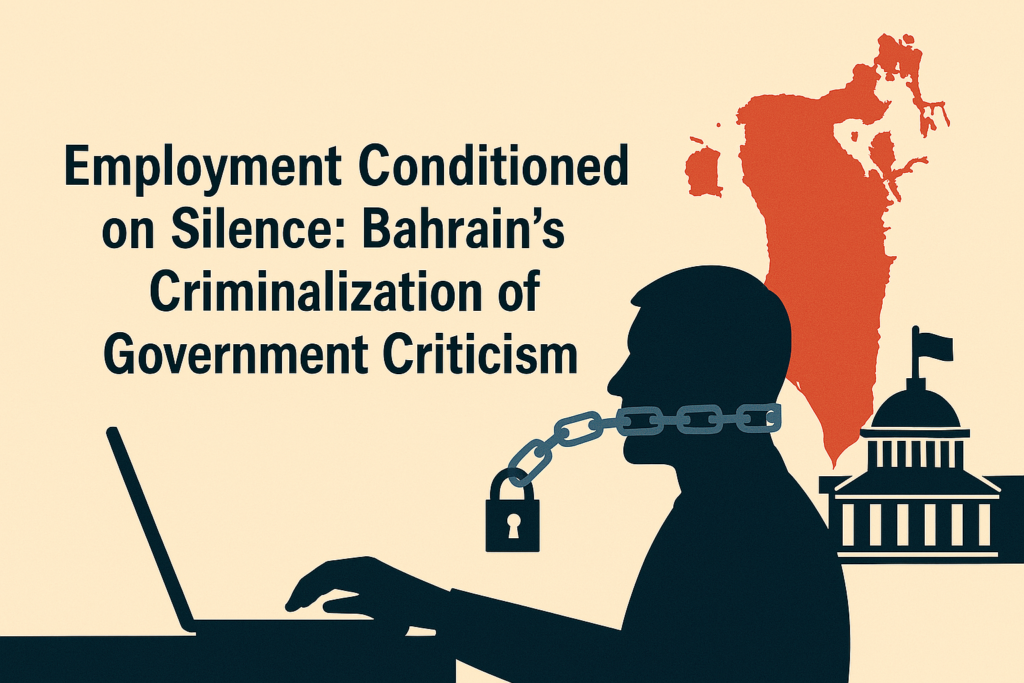Employment Conditioned on Silence: Bahrain’s Criminalization of Government Criticism

In July 2020, the Bahraini government passed significant amendments to the Civil Service Law, sparking widespread controversy over freedom of expression and the rights of public sector employees. For the first time, the amendments explicitly allowed the dismissal of any government employee for criticizing state policies on social media or through any other medium.
The changes, which took effect on July 9, 2020, modified Article 34, Clause 10 of the executive regulations of the Civil Service Law, issued by Royal Decree No. 48 of 2010. The revised text states: “An employee – throughout the period of employment – may express their views through all available means, provided that such views do not provoke division within society or criticize government policies or decisions through any means whatsoever.”
While these amendments represent the first explicit legal prohibition against criticizing the government and its institutions, in practice, Bahraini authorities have long maintained a systematic clampdown on free expression using other laws, including the Penal Code and the Press and Publications Law. Over the years, these laws have contained vaguely worded provisions that are interpreted by the authorities in ways that restrict dissent and silence opposition.
One notable example is the 2015 dismissal of activist Nader Abdul Imam by the Ministry of Education. He had served for approximately 14 years but was terminated after serving a four-month prison sentence for a tweet discussing the controversial historical figure Khalid ibn al-Walid. Despite having completed his sentence, the government later dismissed him from his job—an act widely seen as retaliatory and aimed at intimidating dissenters.
The year 2015 was tumultuous and marked by heightened repression. It is considered the second harshest year for the Bahraini opposition after 2011. Early that year, on December 28, 2014, the authorities arrested Sheikh Ali Salman, Secretary-General of the Al-Wefaq National Islamic Society and the leader of the opposition. Just two weeks later, former MP and head of Al-Wefaq’s Shura Council, Jameel Kadhim, was arrested over a tweet criticizing the use of political money in the November 2014 parliamentary elections. He was sentenced to six months in prison and fined 500 Bahraini dinars (~$1,325 USD).
That same year, Bahrain joined the military coalition in the war on Yemen, which triggered a fresh wave of repression against those who dared to oppose this military engagement. Several prominent figures were imprisoned, including human rights activist Nabeel Rajab, former Al-Wahdawi Secretary-General Fadhel Abbas, and well-known Twitter users Yousif Al-Mu and “Bukhamees.” After serving his sentence, Fadhel Abbas was also dismissed from his post at the Ministry of Education, further demonstrating the government’s use of dual punishment: imprisonment followed by professional exclusion.
These repressive measures are no longer confined to imprisonment or dismissals alone. Rather, they now serve to instill fear and encourage widespread self-censorship among citizens, discouraging them from expressing even mild criticism. Over time, the scope of this crackdown has expanded beyond traditional opposition figures to include individuals traditionally aligned with the government or those perceived as neutral. A recent example is the case of activist Lulwa Al-Benali, who was fired from the Ministry of Education for posts in which she criticized ministry officials.
Another striking case is that of journalist Saleh Al-Mu, who faced legal questioning over posts about local administrative issues—such as the distribution of garbage bags in municipalities—highlighting how suppression has extended from political dissent to criticism of basic public services.
From a legal standpoint, Bahraini courts have relied heavily on several vague articles in the Penal Code to justify such actions, particularly Articles 133, 134, 160, 165, 168, and 172. These broadly defined provisions provide the state with the tools to arbitrarily interpret the law, facilitating repression under the guise of legality and severely curbing fundamental freedoms.
Some may interpret the decline in reported cases in recent years as a sign of reduced government pressure or a shift toward greater tolerance. However, this perception is misleading. What has occurred is an increase in self-censorship, driven by fear of punishment and legal retaliation—not because of genuine improvements in the political or human rights climate.
A state that seeks to monopolize opinion and suppress all forms of critique deprives itself of the vital input necessary for societal development. Freedom of expression is not a luxury—it is a prerequisite for stability, progress, and inclusive governance. The Bahraini government must reconsider its restrictive legal framework and repeal laws that directly clash with its citizens’ constitutional rights to voice their opinions.
Pluralism of thought and political diversity do not threaten national stability; they reinforce it. Conversely, a state that insists on enforcing a singular narrative while silencing all others risks trapping its society in a state of perpetual tension—one that could erupt at any moment, with potentially grave consequences.